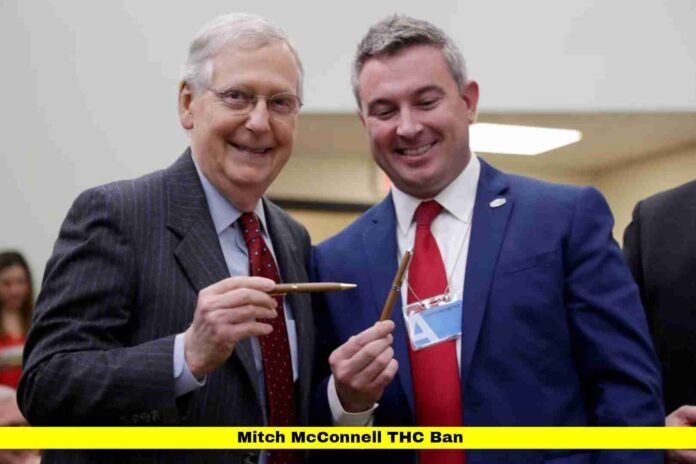Senator Mitch McConnell’s THC ban proposal is generating major headlines — and worries — after Congress tightened federal rules on hemp-derived products. The changes, tucked into a must-pass funding bill, would sharply restrict THC content in consumable hemp goods, raising alarm among farmers, CBD businesses, and regulators alike.
What Is McConnell Actually Proposing?
McConnell is pushing for a redefinition of “hemp” in federal law. Under his plan, hemp-derived cannabinoid products (like delta-8 THC) would face a strict new cap: no more than 0.4 milligrams of total THC per container. That’s a major shift from existing rules. The goal, he says, is to close what he calls a loophole in the 2018 Farm Bill that has allowed unregulated intoxicating products to flood the market.
Why McConnell Says the Change Is Needed
- He argues that companies are extracting tiny amounts of THC from legal hemp and converting it into more potent or intoxicating compounds.
- McConnell also insists that many of those products — gummies, vapes, beverages — are being sold in convenient places like gas stations and corner stores, and marketed in a way that might appeal to children.
- He frames this move as a public safety measure, protecting consumers from poorly regulated psychoactive hemp products.
What the New Law Would Do
Under the proposed changes:
- The federal definition of “hemp” would be tightened to include only naturally occurring, non-synthetic cannabinoids.
- Hemp would be tested on total THC (including THCA) rather than just delta-9 THC.
- A cap of 0.4 mg THC per container for finished products would be enforced — a level many in the hemp industry say is too low for most items currently on the market.
- The changes would take effect one year after enactment, giving businesses time to adjust.
Industry Reaction: Alarm Bells All Around
The backlash has been swift and loud:
- Senator Rand Paul (R-Ky.), a fellow Kentuckian, slammed the provisions as a “regulate-to-death” move, warning that the rules could choke off the entire hemp-derived THC market.
- Hemp advocacy groups argue that the 0.4 mg limit would make most existing THC-infused hemp products illegal — from gummies to beverages to “THC-lite” wellness items.
- Many small farmers and processors say the ban could wipe out a huge portion of the industry, endangering livelihoods and small businesses built around “hemp” wellness products.
Legislative Roadmap & Political Tensions
The measure landed in a 2026 agriculture funding bill — a high-stakes vehicle tied to ending a government shutdown. That gave McConnell’s provision extra leverage.
Yet the path hasn’t been smooth:
- A Senate subcommittee temporarily dropped the ban after McConnell met strong resistance from Paul and other senators.
- According to congressional analysis, McConnell insisted the change was just about redefining hemp — not killing the non-intoxicating CBD business.
- However, critics say the provision’s broad language could sweep in many CBD products that legitimately contain trace THC, not just delta-8 or delta-10.
Broader Implications
If McConnell’s THC ban becomes law:
- Many hemp products — especially those with even modest psychoactive effects — could vanish from legal shelves.
- Hemp farmers may face huge losses as demand for currently legal THC-rich hemp declines.
- Regulators will gain stronger authority to define allowable “quantifiable amounts” of THC in hemp-based consumer products.
- States with more relaxed hemp-THC policies might see their laws overridden, sparking tension between state and federal regulation.
Why This Crackdown Is Especially Noteworthy
This isn’t just a tweak — it’s a potential turning point for the hemp industry:
- McConnell was once a major backer of the 2018 Farm Bill, which broadly legalized hemp cultivation. Now he argues that same legislation is being misused.
- The changes could serve as a model for future federal regulation. If total-THC limits become the norm, many hemp-derived products will need to be reformulated or pulled.
- Public safety is being positioned as a priority, but opponents worry that many legitimate hemp-derived wellness items will be caught in the crossfire.
What’s Next
Whether McConnell’s THC ban stands or is softened depends on ongoing negotiations in Congress. If the language remains in final appropriations law, its impact could reshape the hemp economy — in just a year. Keep a close eye on how regulators, businesses, and hemp advocates respond.
Want to weigh in or stay updated? Drop a comment below — your voice matters in this fight.
